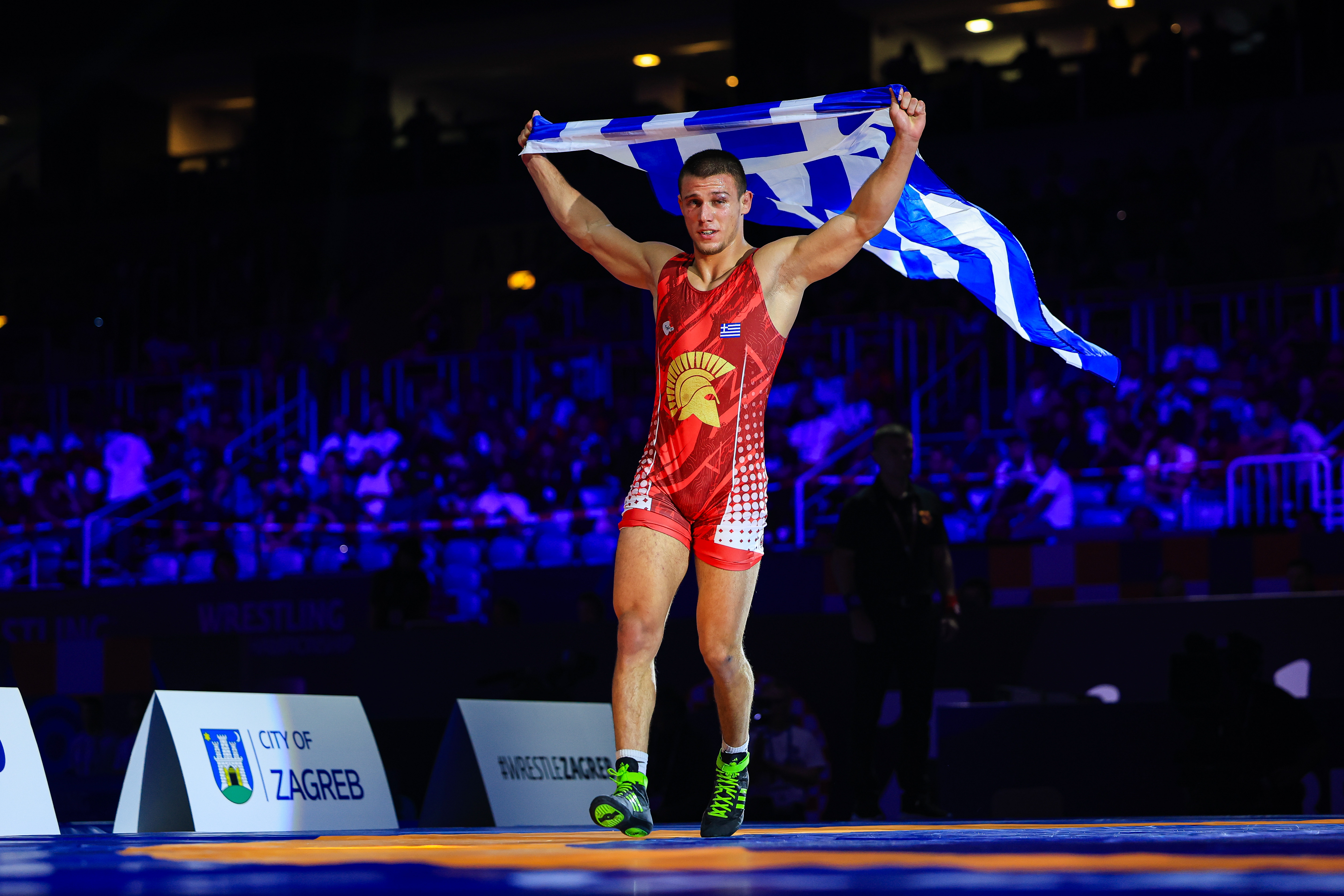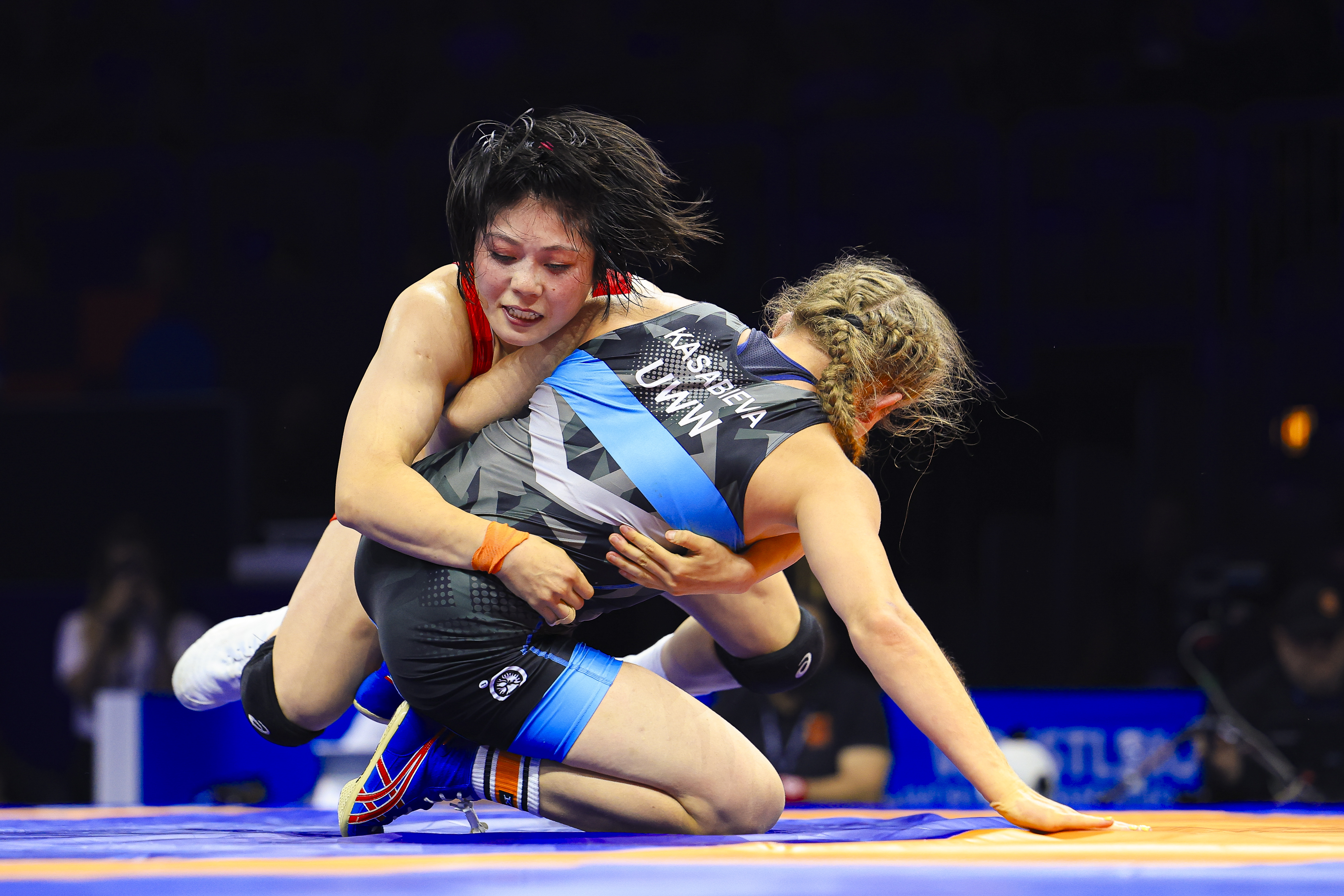ZAGREB, Croatia (January 22) -- The 2026 season will kick off with the Ranking Series in Zagreb. Zagreb Open will begin February 4 to 8 and will be held at Arena Zagreb, the same venue as the World Championships.
Freestyle will kick off the competition on February 4 with six weight classes. February 5 will see the remaining four Freestyle weight classes and two Women's Wrestling weights in action. Day three will be four Women's Wrestling weights and two Greco-Roman.
Both Women's Wrestling and Greco-Roman will be held on day four, February 7, with women's in four and Greco in two weight classes. Last and day five will be all Greco with six weight classes.
Click here for full schedule of Zagreb Open 2026 Ranking Series.
All action will be live on UWW+. Subscribe to UWW+ to watch.
Greco-Roman
55kg
Filip BARTOSIK (CZE)
Koba KARUMIDZE (GEO)
LALIT (IND)
Arsen ZHUMA (KAZ)
Nurzat KABDYRAKHIMOV (KAZ)
Yersin ABYIR (KAZ)
Artiom DELEANU (MDA)
Sebastian KOLOMPAR (SRB)
Omer RECEP (TUR)
Brady KOONTZ (USA)
Ikhtiyor BOTIROV (UZB)
Jasurbek ORTIKBOEV (UZB)
60kg
Dimitri KHACHIDZE (GEO)
SAHIL (IND)
Koto GOMI (JPN)
Yu SHIOTANI (JPN)
Amangali BEKBOLATOV (KAZ)
Galym KABDUNASSAROV (KAZ)
Yerbol KAMALIYEV (KAZ)
Corneliu RUSU (MDA)
Georgij TIBILOV (SRB)
Mert ILBARS (TUR)
Dalton ROBERTS (USA)
Maxwell BLACK (USA)
Zane RICHARDS (USA)
Alisher GANIEV (UZB)
Mehroj BAKHRAMOV (UZB)
63kg
Nikolay VICHEV (BUL)
Adham ELSAYED (EGY)
Pridon ABULADZE (GEO)
CHETAN (IND)
Aidos SULTANGALI (KAZ)
Dastan ZARLYKHANOV (KAZ)
Saifulla KURMAN (KAZ)
Vitalie ERIOMENCO (MDA)
Morten THORESEN (NOR)
Dejan BERKEC (SRB)
Ardit FAZLJIJA (SWE)
Ildar HAFIZOV (USA)
Rhett PEAK (USA)
Islomjon BAKHRAMOV (UZB)
Khusniddin OLIMBOEV (UZB)
67kg
Aker SCHMID (AUT)
Dominik ETLINGER (CRO)
Mohamed ABDELREHIM (EGY)
Anri KHOZREVANIDZE (GEO)
Diego CHKHIKVADZE (GEO)
Sachin SAHRAWAT (IND)
Katsuaki ENDO (JPN)
Kyotaro SOGABE (JPN)
Din KOSHKAR (KAZ)
Meiirzhan SHERMAKHANBET (KAZ)
Yerzhet ZHARLYKASSYN (KAZ)
Valentin PETIC (MDA)
Sebastian NAD (SRB)
Niklas OEHLEN (SWE)
Murat FIRAT (TUR)
Alston NUTTER (USA)
Otto BLACK (USA)
Aytjan KHALMAKHANOV (UZB)
Oybek SHARIBJONOV (UZB)
72kg
Estebane TSCHARNER (CIV)
Pavel PUKLAVEC (CRO)
Moustafa ALAMELDIN (EGY)
Mishiko ALEKSANDRIA (GEO)
Nika BROLADZE (GEO)
Krisztian VANCZA (HUN)
Krisztofer KLANYI (HUN)
Kuldeep MALIK (IND)
Almatbek AMANBEK (KAZ)
Daniyar KALENOV (KAZ)
Nikolay KHAPKO (KAZ)
Henrik DAHLEN (SWE)
Cengiz ARSLAN (TUR)
Alejandro SANCHO (USA)
Benjamin PEAK (USA)
Abror ATABAEV (UZB)
Shakhzod KUCHKOROV (UZB)
77kg
Stoyan KUBATOV (BUL)
Antonio KAMENJASEVIC (CRO)
Luka IVANCIC (CRO)
Ehab KHALIL (EGY)
Yehia ABDELKADER (EGY)
Temuri ORJONIKIDZE (GEO)
Levente LEVAI (HUN)
Robert FRITSCH (HUN)
Zoltan LEVAI (HUN)
AMAN (IND)
Isami HORIKITA (JPN)
Nao KUSAKA (JPN)
Merey MAULITKANOV (KAZ)
Tamerlan SHADUKAYEV (KAZ)
Alexandru SOLOVEI (MDA)
Aleksa ILIC (SRB)
Artur POLITAIEV (UKR)
Kamal BEY (USA)
Abdullo ALIEV (UZB)
Aram VARDANYAN (UZB)
Doniyorkhon NAKIBOV (UZB)
82kg
Ibrahim TABAEV (BEL)
Filip SACIC (CRO)
Karlo KODRIC (CRO)
Marek VRBA (CZE)
Michal ZELENKA (CZE)
Emad ABOUELATTA (EGY)
Tornike MIKELADZE (GEO)
PRINCE (IND)
Demeu ZHADRAYEV (KAZ)
Ibragim MAGOMADOV (KAZ)
Omar SATAYEV (KAZ)
Mihail BRADU (MDA)
Shahin BADAGHIMOFRAD (QAT)
Antal VAMOS (SRB)
Ognjen JAKOVLJEVIC (SRB)
Alexander JOHANSSON (SWE)
Yuksel SARICICEK (TUR)
Mykyta POLITAIEV (UKR)
Beka MELELASHVILI (USA)
Jesse PORTER (USA)
Azimjon SOATULLAEV (UZB)
Samandar BOBONAZAROV (UZB)
87kg
Deyvid DIMITROV (BUL)
Antonio LUKAC (CRO)
Ivan HUKLEK (CRO)
Matej MANDIC (CRO)
Turpal BISULTANOV (DEN)
Fares GHALY (EGY)
Mahmoud IBRAHIM (EGY)
Achiko BOLKVADZE (GEO)
Erik SZILVASSY (HUN)
Istvan TAKACS (HUN)
Tamas LEVAI (HUN)
ROHIT (IND)
Islam YEVLOYEV (KAZ)
Maksat SAILAU (KAZ)
Nursultan TURSYNOV (KAZ)
Marcel STERKENBURG (NED)
Andrija MIHAJLOVIC (SRB)
Dogan KAYA (TUR)
Payton JACOBSON (USA)
Zachary BRAUNAGEL (USA)
Jalgasbay BERDIMURATOV (UZB)
Mukhammadkodir RASULOV (UZB)
Rahimjon UZOKOV (UZB)
97kg
Daniel GASTL (AUT)
Filip SMETKO (CRO)
Kristian LUKAC (CRO)
Tomislav BRKAN (CRO)
Mathias BAK (DEN)
Mohamed GABR (EGY)
Luka GABISONIA (GEO)
Alex SZOKE (HUN)
NITESH (IND)
Takahiro TSURUDA (JPN)
Iussuf MATSIYEV (KAZ)
Nurassyl AMANALY (KAZ)
Tyrone STERKENBURG (NED)
Luka KATIC (SRB)
Mihail KAJAIA (SRB)
Uros KRSTIN (SRB)
Aleksandar STJEPANETIC (SWE)
Abdul CEBI (TUR)
Michial FOY (USA)
Javokhir SHODIYAROV (UZB)
130kg
Marko MILANOVIC (CRO)
Artur SARKISJAN (CZE)
Giga SHAVADZE (GEO)
Rati TALIKISHVILI (GEO)
Darius VITEK (HUN)
Laszlo DARABOS (HUN)
Joginder RATHEE (IND)
Alimkhan SYZDYKOV (KAZ)
Olzhas SYRLYBAY (KAZ)
Oskar MARVIK (NOR)
Jacob LOGAARD (SWE)
Riza KAYAALP (TUR)
Aden ATTAO (USA)
Cohlton SCHULTZ (USA)
Courtney FREEMAN (USA)
 World champion at 79kg Georgios KOUGIOUMTSIDIS (GRE) is moving up to 86kg. (Photo: United World Wrestling / Kadir Caliskan)
World champion at 79kg Georgios KOUGIOUMTSIDIS (GRE) is moving up to 86kg. (Photo: United World Wrestling / Kadir Caliskan)
Freestyle
57kg
Guesseppe REA VILLARROEL (ECU)
Nikoloz BOTCHORISHVILI (GEO)
Roberti DINGASHVILI (GEO)
AMAN (IND)
ANKUSH (IND)
Atish TODKAR (IND)
Fuga SASAKI (JPN)
Roman BRAVO YOUNG (MEX)
Azamat TUSKAEV (SRB)
Anthony KNOX (USA)
Liam CRONIN (USA)
Spencer LEE (USA)
61kg
Giorgi GONIASHVILI (GEO)
Ali ABURUMAILA (PLE)
Austin DESANTO (USA)
65kg
Alibeg ALIBEGOV (BRN)
Joshua KRAMER (ECU)
Khamzat ARSAMERZOUEV (FRA)
Nika ZAKASHVILI (GEO)
Gamzatgadzsi HALIDOV (HUN)
Zoltan MIZSEI (HUN)
SUJEET (IND)
Vishal KALIRAMANA (IND)
Takara SUDA (JPN)
Joseph MCKENNA (USA)
70kg
Alexander SEIWALD (AUT)
Muhammad ABDURACHMANOV (BEL)
Akaki KEMERTELIDZE (GEO)
Iszmail MUSZUKAJEV (HUN)
ABHIMANYOU (IND)
Patryk OLENCZYN (POL)
Caleb HENSON (USA)
Ian PARKER (USA)
Tyler KASAK (USA)
74kg
Muhamed BEKTEMIROV (AUT)
Magomedrasul ASLUEV (BRN)
Adam THOMSON (CAN)
Seyfulla ITAEV (FRA)
Giorgi ELBAKIDZE (GEO)
Benjamin DOBLER (HUN)
Murad KURAMAGOMEDOV (HUN)
CHANDERMOHAN (IND)
DEEPAK (IND)
Yoshinosuke AOYAGI (JPN)
Kamil RYBICKI (POL)
Alfred DANIEL (SLE)
David CARR (USA)
James GREEN (USA)
Jarrett JACQUES (USA)
79kg
Zelimkhan KHADJIEV (FRA)
Otari ADEISHVILI (GEO)
Tariel GAPHRINDASHVILI (GEO)
AMIT (IND)
Krisztian BIRO (ROU)
Daniel BRAUNAGEL (USA)
Dean HAMITI (USA)
Evan WICK (USA)
86kg
Simon MARCHL (AUT)
Khidir SAIPUDINOV (BRN)
Connor CHURCH (CAN)
Vladimeri GAMKRELIDZE (GEO)
Georgios KOUGIOUMTSIDIS (GRE)
Mukul DAHIYA (IND)
Sandeep MANN (IND)
Cezary SADOWSKI (POL)
Gabriel MC DUFFIE (SLE)
Parker KECKEISEN (USA)
Zahid VALENCIA (USA)
92kg
Magomed SHARIPOV (BRN)
Zaur BERADZE (GEO)
Jointy KUMAR (IND)
Shane JONES (PUR)
Dustin PLOTT (USA)
Michael MACCHIAVELLO (USA)
Trent HIDLAY (USA)
97kg
Benjamin GREIL (AUT)
Samuel PEREIRA (CAN)
Adlan VISKHANOV (FRA)
Konstantine PETRIASHVILI (GEO)
Merab SULEIMANISHVILI (GEO)
Musza ARSUNKAEV (HUN)
Richard VEGH (HUN)
Deepak CHAHAL (IND)
VICKY (IND)
Kamil KURUGLIYEV (KAZ)
Stephen BUCHANAN (USA)
Zane LANHAM (USA)
125kg
Johannes LUDESCHER (AUT)
Shamil SHARIPOV (BRN)
Aleksandre ABRAMISHVILI (GEO)
Vlagyiszlav BAJCAJEV (HUN)
DINESH (IND)
Mahendra GAIKWAD (IND)
Kamil KOSCIOLEK (POL)
Robert BARAN (POL)
Ceron FRANCISCO (USA)
Demetrius THOMAS (USA)
Wyatt HENDRICKSON (USA)
 Miwa MORIKAWA (JPN), world 65kg champion, is entered at 68kg. (Photo: United World Wrestling / Kadir Caliskan)
Miwa MORIKAWA (JPN), world 65kg champion, is entered at 68kg. (Photo: United World Wrestling / Kadir Caliskan)
Women's Wrestling
50kg
Asmar JANKURTARAN (AZE)
Elnura MAMMADOVA (AZE)
Kamila BARBOSA (BRA)
Augusta EVE (CAN)
Ena ZEMUNIC (CRO)
Laura BOGATIC (CRO)
Laura FATH (HUN)
MUSKAN (IND)
NEELAM (IND)
Emanuela LIUZZI (ITA)
Haruna MORIKAWA (JPN)
Zeinep BAYANOVA (KAZ)
Agata WALERZAK (POL)
Natalia WALCZAK (POL)
Nipuni HEWA PEDIGE (SRI)
Kendra RYAN (USA)
Elizaveta SMIRNOVA (UWW)
53kg
Nargiz SAMADOVA (AZE)
Emma LUTTENAUER (FRA)
Annika WENDLE (GER)
Gerda TEREK (HUN)
Anjali KACHHAWA (IND)
ANTIM (IND)
Umi IMAI (JPN)
Roksana ZASINA (POL)
Andreea ANA (ROU)
Nethmi PORUTHOTAGE (SRI)
Everest LEYDECKER (USA)
Katie GOMEZ (USA)
Sydney PETZINGER (USA)
55kg
Madison MACKENZIE (CAN)
JYOTI (IND)
Nagisa HARADA (JPN)
Beatrice FERENT (ROU)
Tuba DEMIR (TUR)
Amani JONES (USA)
Areana VILLAESCUSA (USA)
Jacarra WINCHESTER (USA)
Ekaterina VERBINA (UWW)
57kg
Zhala ALIYEVA (AZE)
Giullia PENALBER (BRA)
Samantha STEWART (CAN)
Jenna HEMIAE (FIN)
Amory ANDRICH (GER)
Roza SZENTTAMASI (HUN)
Tamara DOLLAK (HUN)
MANISHA (IND)
Himeka TOKUHARA (JPN)
Nilufar RAIMOVA (KAZ)
Felicitas DOMAJEVA (NOR)
Georgiana LIRCA (ROU)
Evelina HULTHEN (SWE)
Tindra DALMYR (SWE)
Elvira KAMALOGLU (TUR)
Amanda MARTINEZ (USA)
59kg
Hiunai HURBANOVA (AZE)
Iris SLATKA (CRO)
Elena BRUGGER (GER)
Erika BOGNAR (HUN)
RAJNITA (IND)
Sena NAGAMOTO (JPN)
Bediha GUN (TUR)
Abigail NETTE (USA)
Alexis JANIAK (USA)
62kg
Lais NUNES (BRA)
Lana NOGIC (CRO)
Ameline DOUARRE (FRA)
Luisa SCHEEL (GER)
Naemi LEISTNER (GER)
Eniko ELEKES (HUN)
ANJLI (IND)
Bhagyashree FAND (IND)
Aurora CAMPAGNA (ITA)
Nonoka OZAKI (JPN)
Irina KUZNETSOVA (KAZ)
Grace BULLEN (NOR)
Amina CAPEZAN (ROU)
Johanna LINDBORG (SWE)
Alara BOYD (USA)
Macey KILTY (USA)
Marilyn GARCIA (USA)
Anastasiia SIDELNIKOVA (UWW)
65kg
Marijana SUMSKI (CRO)
PULKIT (IND)
Nana IKEHATA (JPN)
Kriszta INCZE (ROU)
Agnes NYGREN (SWE)
Jennifer PAGE (USA)
68kg
Birgul SOLTANOVA (AZE)
Aleah NICKEL (CAN)
Pauline LECARPENTIER (FRA)
Gerda BARTH (GER)
Laura KOEHLER (GER)
Karolina POK (HUN)
Noémi SZABADOS (HUN)
Mansi LATHER (IND)
NISHA (IND)
Miwa MORIKAWA (JPN)
Kateryna ZELENYKH (ROU)
Masa PEROVIC (SRB)
Tindra SJOEBERG (SWE)
Nesrin BAS (TUR)
Kennedy BLADES (USA)
Solin PIEARCY (USA)
Alina SHEVCHENKO (UWW)
Elizaveta PETLIAKOVA (UWW)
72kg
Zahra KARIMZADA (AZE)
Veronika VILK (CRO)
Sophia SCHAEFLE (GER)
Diksha MALIK (IND)
Mahiro YOSHITAKE (JPN)
Buse TOSUN (TUR)
Alexandria GLAUDE (USA)
Kaylynn ALBRECHT (USA)
Kristina BRATCHIKOVA (UWW)
76kg
Madisyn GROF (CAN)
Kendra DACHER (FRA)
Jyoti BERWAL (IND)
PRIYA (IND)
Enrica RINALDI (ITA)
Yasuha MATSUYUKI (JPN)
Gulmaral YERKEBAYEVA (KAZ)
Kamile GAUCAITE (LTU)
Alexandra ANGHEL (ROU)
Tristan KELLY (USA)



 World champion at 79kg Georgios KOUGIOUMTSIDIS (GRE) is moving up to 86kg. (Photo: United World Wrestling / Kadir Caliskan)
World champion at 79kg Georgios KOUGIOUMTSIDIS (GRE) is moving up to 86kg. (Photo: United World Wrestling / Kadir Caliskan) Miwa MORIKAWA (JPN), world 65kg champion, is entered at 68kg. (Photo: United World Wrestling / Kadir Caliskan)
Miwa MORIKAWA (JPN), world 65kg champion, is entered at 68kg. (Photo: United World Wrestling / Kadir Caliskan)
Share your thoughts.
Comments